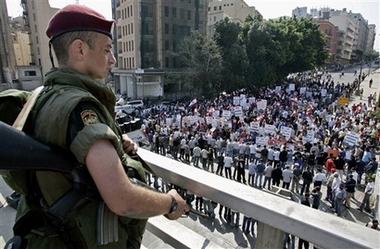 BIKFAYA, Lebanon By Edward Cody
BIKFAYA, Lebanon By Edward Cody
Gemayel’s father, Pierre, was a pharmacist who became a leader of the independence movement. His elder brother, Bashir, was president briefly in 1982 before being assassinated at the behest of the Syrian government.
The Lebanon most foreigners think of — tolerant, easy-living, Western-oriented — bore the imprint of Maronite families such as the Gemayels, and not by accident. France, the mandate power here until just after World War II, originally carved Lebanon off from Syria to provide a place for the Maronites in the predominantly Muslim Middle East. They made it into a "hinge country," linking East and West.
To rule the new country and preserve its unusual personality, France left behind a system under which the president and the army commander must be Maronites, giving decisive power to what was then the major community. The prime minister was to be Sunni Muslim and the speaker of parliament a Shiite.
Hezbollah’s emergence as a political party and armed militia in large measure was a response to that shift. In effect, it stepped in to represent Shiites because many of them felt the government did not, particularly in the southern hills along the border with Israel.
"We are not a replacement for the state," Hassan Nasrallah, the Hezbollah leader, said in a recent televised interview. "But where the state is absent, we have to take up the slack."
The war with Israel further dramatized the gap between Lebanon’s institutions and its new political demography. Communal strains had been swept under the rug for years under the leadership of Prime Minister Rafik al-Hariri, who was killed in 2005. But in the crucible of a destructive, bloody war, those strains suddenly seemed glaring.
Lebanon’s official Maronite-led army sat out the conflict, for instance, while Hezbollah’s militia, which was better armed, did the fighting and dying. President Emile Lahoud, the other Maronite pillar of power, was also on the sidelines because of his association with Syria, an ally of Hezbollah.
As a result, Prime Minister Fuad Saniora, a Sunni economist, spoke in the name of Lebanon and received foreign visitors such as Secretary of State Condoleezza Rice for negotiations about the war. But he had to check with Nasrallah for important decisions, because Hezbollah was the seat of Lebanon’s real power of war or peace.
"What institutions do we have?" said Social Affairs Minister Nayla Moawad, a Maronite and widow of assassinated president Rene Moawad. "We have inherited a non-administration. The Lebanese government is like this box," she said, holding up a silver coffee-table decoration. "There is nothing in it. It is empty."
Moawad and other Christians, along with Sunni Muslims, have stressed that the right response is strengthening the Lebanese government. Hezbollah must recognize that only the state can have the power of arms, they said, and it must turn away from Iranian-style theocracy to become part of the relaxed mix that has made Lebanon so attractive over the years to investors and Arab vacationers.
"It is up to Hezbollah to make this decision," Gemayel said. "Unfortunately, Lebanon is hanging on the choice."
The country’s Sunni establishment, although it fought the Maronites in the 1950s and again in the 1970s in the heyday of Arab nationalism, has recoiled at Hezbollah’s politically charged brand of Islam and its ties with Iran. In the debate over Lebanon’s identity, conducted before the war in a round of meetings called the National Dialogue, most Sunnis opted for alliance with the Maronites and endorsed their demand for Hezbollah’s disarmament.
Nasrallah has gone out of his way to reassure fellow Lebanese that Hezbollah has no intention of remaking Lebanon to look like Iran. In his recent interview, he pledged loyalty to the Lebanese tradition of religious and social tolerance.
"Lebanon is a pluralistic country," he declared. "It is not an Islamic country. It is not a Maronite country. It is not an Orthodox country. It is not a Shiite country. It is a country of consensus. You have nothing to fear from anybody from Hezbollah."
But Nasrallah’s pledge was not well received by many Sunnis and Maronites. Hezbollah only weeks ago went to war without consulting the government, they noted.
Perhaps more important, they noted, was Nasrallah’s postwar assertion that Hezbollah must be taken into account in government deliberations. The party gained seats in parliament and two ministers in Saniora’s cabinet in the last elections. But Nasrallah seemed to be saying his group will be seeking more power now that, in his words, it fought a war on Lebanon’s behalf.
A share of power that reflects the Shiites’ true place in the population would likely change Lebanon’s orientation significantly, they predicted. But a refusal to acknowledge the demographic change and Hezbollah’s enhanced status after the war, they said, would be a recipe for more intercommunal conflict. As a result, the timeless view from Gemayel’s terrace may be in for a change.
"I don’t see Lebanon surviving as it is today," said Dori Chamoun, leader of the Maronite-based National Liberal party and son of a former president and longtime political figure, the late Camille Chamoun. "It is inevitable that the Christians will have a smaller share of the country. I only see one solution, cantonization. Everybody wants it. Nobody says it out loud."
In a recent book, Gemayel proposed abandoning Lebanon’s current system and replacing it with election of the president by popular vote and decentralization along the geographic lines that largely define where Muslims and Christians live in any case. "The institutions of Lebanon are tired," he said. "They are drained of their blood."



